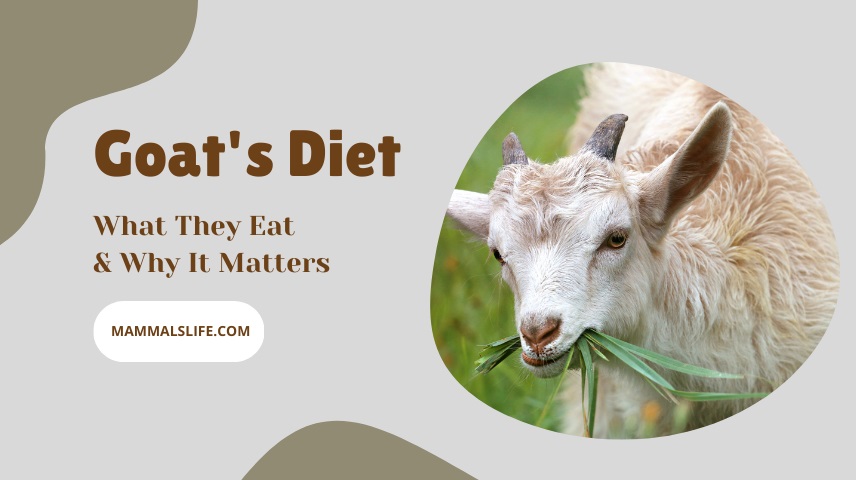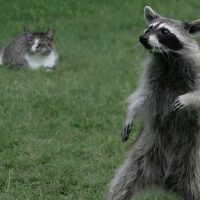Last Updated on February 22, 2025 by Mammals Life
Goats eat a varied diet of grasses, shrubs, and grains. Their diet impacts their health and milk production.
Goats are versatile herbivores with diverse dietary needs. They thrive on a mix of grasses, shrubs, and grains, which provide essential nutrients. This diet is crucial for their overall health, growth, and milk production. Proper nutrition helps in preventing diseases and ensures robust immunity.
Goats also need minerals and vitamins, often supplemented through salt licks. Understanding what goats eat and why it matters allows farmers to optimize their livestock’s productivity. A balanced diet enhances their well-being, leading to better milk quality and meat yield. Ensuring goats receive appropriate nutrition is key to sustainable and profitable goat farming.
Introduction To Goat Diets
Goats are interesting animals with unique dietary needs. Understanding their diet is crucial for their health. A proper diet ensures they stay strong and productive.
Importance Of Diet
Diet plays a vital role in a goat’s health. A balanced diet supports their growth and milk production. Proper nutrition prevents diseases and keeps goats happy.
Common Misconceptions
Many think goats can eat anything. This is not true. Goats are picky eaters. They prefer fresh and clean food. Another myth is that goats do not need water. Goats need lots of water daily.
| Food | Benefits |
|---|---|
| Hay | Rich in fiber and keeps their digestive system healthy |
| Grains | Provides energy and essential nutrients |
| Fresh Greens | Offers vitamins and minerals |
- Hay: Essential for digestion.
- Grains: Good for energy.
- Fresh Greens: Packed with vitamins.
- Always provide fresh water.
- Ensure a balanced diet.
- Monitor their eating habits.
Natural Foraging Habits
Goats are known for their unique and diverse natural foraging habits. Understanding what they eat and why it matters is crucial for proper goat care. Let’s dive into the specifics of their diet and how it changes with seasons.
Types Of Vegetation
Goats are browsers, not grazers. This means they prefer to eat a variety of plants. They do not just stick to grass. Here are some types of vegetation they enjoy:
- Shrubs: Goats love eating leaves from shrubs. These provide essential nutrients.
- Weeds: They munch on a variety of weeds. Weeds often have medicinal properties.
- Trees: Goats also eat leaves and twigs from trees. Trees offer high fiber content.
Seasonal Variations
The diet of goats changes with the seasons. This ensures they get the nutrients they need year-round.
| Season | Food Sources |
|---|---|
| Spring | Fresh grass, budding shrubs, and young leaves. |
| Summer | Thick foliage, mature leaves, and flowering plants. |
| Fall | Dried leaves, late-blooming plants, and acorns. |
| Winter | Stored hay, bark, and twigs. |
Understanding these natural foraging habits helps in providing a balanced diet. It ensures that goats remain healthy and productive throughout the year.
Supplemental Feeding
Supplemental feeding is crucial for goats’ health. It ensures they get all the needed nutrients. Grazing alone may not suffice. Learn about commercial feeds and homemade options to boost their diet.
Commercial Feeds
Commercial feeds are convenient for goat owners. They offer a balanced diet with essential nutrients. These feeds come in pellets, grains, and mixes. Look for high-quality, reputable brands.
- Pellets: Easy to store and feed, packed with nutrients.
- Grains: Provide energy and are readily available.
- Mixes: A blend of grains and minerals, ensuring variety.
Ensure the feed has adequate protein and fiber. Avoid feeds with too much fat or sugar. Always check the label for nutritional information.
Homemade Options
Homemade options allow control over what goats eat. They can be cost-effective and fresh. Consider these simple recipes:
- Grain Mix: Combine oats, barley, and corn.
- Veggie Treats: Carrots, beets, and pumpkin slices.
- Mineral Blocks: Homemade mineral blocks with salt and trace minerals.
Ensure the ingredients are clean and fresh. Avoid giving moldy or spoiled food. Rotate the diet to keep it balanced and interesting.
| Feed Type | Benefits | Considerations |
|---|---|---|
| Pellets | Easy to store, balanced nutrition | Check for quality, avoid fillers |
| Grains | High energy, readily available | Not too much, balance with fiber |
| Homemade Mixes | Fresh, customizable | Ensure balance, avoid spoilage |
Nutritional Requirements
Understanding the nutritional requirements of goats is vital for their health. Goats need a balanced diet to thrive. This section will explain the essential nutrients goats need and how age and health affect their diet.
Essential Nutrients
Goats need various essential nutrients for a healthy life. These include proteins, carbohydrates, fats, vitamins, and minerals. Each nutrient plays a specific role in their growth and maintenance.
- Proteins: Crucial for growth and muscle development.
- Carbohydrates: Provide energy for daily activities.
- Fats: Important for energy storage and insulation.
- Vitamins: Necessary for metabolic functions.
- Minerals: Support bone health and various bodily functions.
A balanced diet ensures goats get all these nutrients. This helps in preventing malnutrition and related health issues.
Age And Health Considerations
The age and health of a goat influence its dietary needs. Young goats need more proteins for growth. Older goats might need diets lower in energy but higher in fiber.
| Age Group | Dietary Needs |
|---|---|
| Kids (0-6 months) | High protein, milk, and grains |
| Adults (6 months and older) | Balanced diet with hay, grains, and minerals |
| Seniors (7 years and older) | High fiber, easy-to-digest foods |
Health conditions also alter dietary needs. Sick goats may need special supplements. Always consult a vet for specific dietary plans.
Health Impacts
Understanding the health impacts of a goat’s diet is crucial. What goats eat directly affects their overall well-being. A balanced diet helps goats grow strong and healthy. An unbalanced diet can lead to serious health issues.
Common Deficiencies
Goats can suffer from various nutrient deficiencies. Some common deficiencies include:
- Calcium: Essential for strong bones and teeth.
- Phosphorus: Important for energy and metabolism.
- Vitamin A: Necessary for vision and immune function.
- Vitamin E: Acts as an antioxidant, protecting cells.
These deficiencies can cause severe health problems. For example, calcium deficiency can lead to weak bones. Vitamin A deficiency can result in poor vision.
Several diseases are linked to a poor diet. Some common diet-related diseases in goats include:
- Enterotoxemia: Caused by overeating grains or rich pasture.
- Acidosis: This occurs when goats eat too many fermentable carbohydrates.
- Urinary Calculi: Results from an imbalance of calcium and phosphorus.
- White Muscle Disease: Due to a lack of selenium and Vitamin E.
These diseases can be life-threatening. Preventing them requires a well-balanced diet. Proper nutrition is vital for a goat’s health and longevity.
Sustainable Feeding Practices
Feeding goats sustainably is crucial for their health and the environment. By using sustainable feeding practices, you can ensure your goats thrive. Let’s explore some key aspects of sustainable goat feeding.
Environmental Impact
Sustainable feeding reduces the environmental footprint of goat farming. It involves using natural resources wisely and minimizing waste. For instance, rotating grazing areas prevents overgrazing and soil erosion. Planting native grasses supports local ecosystems and provides natural forage for goats.
Additionally, reducing chemical use in pastures protects water sources. Organic farming practices, like composting manure, enrich soil without harming the environment. Sustainable feeding practices help maintain a balanced ecosystem.
Cost-effective Strategies
Feeding goats sustainably can also save money. Growing your forage reduces feed costs. You can plant crops like alfalfa, clover, and barley, which are nutritious and easy to grow. These crops can be harvested and stored for winter feeding.
Using kitchen scraps and garden waste as supplemental feed is another cost-effective strategy. Goats enjoy eating vegetable peels, fruit scraps, and other leftovers. This reduces food waste and lowers feed expenses.
Here is a table showing some cost-effective feed options:
| Feed Option | Benefits |
|---|---|
| Homegrown Forage | Nutritious and reduces feed costs |
| Kitchen Scraps | Reduces waste and saves money |
| Native Grasses | Supports local ecosystems |
Consider these options for a more sustainable and cost-effective goat diet.
- Rotate grazing areas
- Plant native grasses
- Use organic farming practices
- Grow your forage
- Feed kitchen scraps
By following these practices, you can create a healthy, sustainable diet for your goats.
Frequently Asked Questions
What Should A Goat’s Diet Consist Of?
A goat’s diet should include hay, fresh grass, grains, and clean water. Add minerals and vitamins for balanced nutrition.
What Do Goats Prefer To Eat?
Goats prefer to eat grass, hay, and leaves. They also enjoy fruits, vegetables, and grains. They thrive on a varied diet.
Do Goats Know What To Eat And What Not To Eat?
Goats have an instinct for grazing. They can generally distinguish between safe and harmful plants. However, supervision is still essential.
What Is The Purpose Of Goat Feeding?
The purpose of goat feeding is to ensure proper nutrition, support growth, maintain health, and improve milk and meat production.
What Do Goats Typically Eat?
Goats typically eat grass, hay, leaves, and grains. They also enjoy browsing on shrubs and small trees.
Can Goats Eat Fruits And Vegetables?
Yes, goats can eat fruits and vegetables like apples, carrots, and lettuce. These provide essential vitamins and nutrients.
Conclusion
Understanding a goat’s diet is essential for their health and productivity. Proper nutrition ensures strong immunity and better growth. A balanced diet supports their milk production and overall well-being. By providing the right feed, you contribute to a healthier and happier herd.
Always prioritize quality feed to see the best results.








